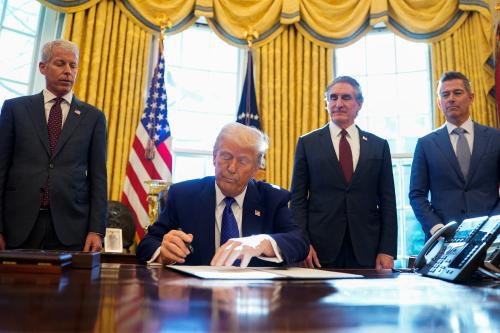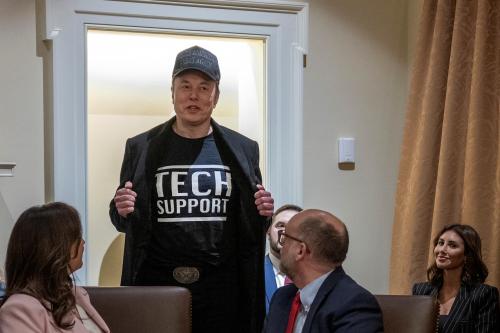Editor’s note: This blog post went live prior to President Obama’s selection of Ron Klain as the new Ebola Czar.
At first it seemed like just another bit of DC irony: a smattering of Republicans, who had skewered Obama over his alleged over-reliance on czars at the start of his presidency were now demanding he appoint one to oversee the nation’s response to the Ebola crisis. By this past weekend, Senator John McCain—no meek opponent of Obama’s supposed czars himself—declared support for an Ebola Czar while making his usual appearance on the Sunday morning political talk shows. By yesterday, President Obama himself had acknowledged the potential need for such an individual.
In comments delivered after a meeting with key administration officials—including Center for Disease Control and Prevention Director Tom Frieden, Homeland Security Adviser Lisa Monaco, Health & Human Services Secretary Sylvia Mathews Burwell, and National Security Adviser Susan Rice— Obama responded to a question about the need for a czar by noting it might be appropriate for him to appoint an individual to oversee the government’s response. He stressed this was not because those surrounding him weren’t doing a great job, but rather because they all had other responsibilities, and that an Ebola Czar could help make sure the administration was “crossing all the t’s and dotting all the i’s going forward.”
On that count, Obama is right, though as I’ve written elsewhere, the potential for any future Ebola Czar to be successful depends as much on the president as it does whoever gets tapped for this new potential position. However, if he does decide to respond to this managerial dilemma by hiring a czar, he has plenty of historical examples to learn from as he decides what kind of person to hire, how much authority to give that person, and how to structure the institutional arrangement he or she will lead. In fact, while the specifics of the Ebola crisis are unique, it is exactly this kind of policy/administration scenario that has led to many, if not most, of the earlier czars Obama’s predecessors have employed.
Indeed, czars typically represent institutional responses from presidential administrations concerned both with managing a complex problem and communicating symbolically to the rest of the nation that the White House is taking the problem seriously. Sometimes, like with Richard Nixon’s energy czars John Love and (more effectively) William Simon, presidents lead the charge for a czar themselves. Other times, as was the case George W. Bush’s War Czar, presidents respond to congressional pressure. Typically, czars are more powerful when they arise from presidential initiative rather than congressional demands. It remains to be seen which of these scenarios plays out, or if Congress and the White House set aside politics and partisanship—in the run-up to the midterms, no less—and cooperate on an efficient and effective solution. While we hold our collective breath for that, there are other key questions we can consider:
What would an Ebola Czar do?
The same thing any czar does: coordinate between and across agencies within the EOP and the cabinet departments—as well as with states and private entities (health care facilities). That isn’t nearly as sexy as a word like ‘czar’ would lead one to believe, particularly after the year or so commentators spent hyperventilating about whether Obama had too many. Nevertheless, that’s what czars are—high-level coordinators for the policy problems that are salient enough to merit significant attention, often involving numerous bureaucratic entities. In this case, President Obama has publicly identified many of the more important agencies involved, such as the DHS and HHS, as well as officials in public health, scientific, and international development sectors of the government. Each of these organizations has its own hierarchical structures, organizational cultures, and operating procedures—the czar’s task is to oversee (and, if empowered effectively enough, enforce) collaboration and information sharing among them. This is always an exceptionally difficult assignment, but might be even more so in light of not only the political realities of the moment but also the Obama Administration’s recent move to further isolate leaders of Cabinet departments.
Who might President Obama choose for such a task?
A better question might be who would want such a job, but this one is important, too. In an article published recently in Presidential Studies Quarterly, I argued that, among other characteristics, presidents are best served when czars possess both administrative and substantive expertise. So while the president might be tempted to call on a popular and well-respected senior statesman-type, he would probably be wise to go with someone who might not have a bold-faced name but does have that hybrid experience on their resume. Further, in the current political climate, getting congressional buy-in is as essential as it is unlikely, so Obama might want to avoid doubling down on the person he nominated as Surgeon General (whose confirmation, incidentally, has been tied up for going on eleven months now) and instead choose someone who opposition and fellow partisans alike might accept. One name that could fit that description that has been touted in recent days is that of Mike Leavitt, a Republican who served as Governor of Utah for a decade and as Secretary of HHS. Leavitt has the managerial and policy bona fides and would likely be gifted a longer grace period from congressional Republicans than any Democrat.
But wait, aren’t czars unconstitutional?
Well, that brings us back to the hubbub over czars during Obama’s transition and establishment of his administration in late 2008 and through much of 2009. The reality is that the argument is far from settled. Although some political scientists take a hard line against czars, viewing them an unconstitutional affront to our Madisonian system of separation of powers and checks and balances, I take a more moderate stance and suggest matters are far more contextual. Certainly, presidents could empower key members of their officials to act in a way that undermines Congress and inappropriately expands the power of the executive branch. In historic practice, though, this has happened rarely and in limited ways, and typically occurs when Congress and the White House want very different things. So far, if Obama appoints a czar, it would be on the heels of congressional Republicans demanding one. How things subsequently play out from there could become a constitutional issue, but the appointment itself would not. Until it does play out, though, we can’t know if any aspect of the ensuing decision making, coordination, and implementation dynamics will be problematic.
Of course, all this is quite academic. Perhaps the winds of salience will shift and both Congress and the president will turn their attention elsewhere. Until then, however, it is useful to think about the administrative options President Obama has before him as he responds to the Ebola crisis, including whether and how he utilizes a czar “super-coordinator” to help him manage the matter.
The Brookings Institution is committed to quality, independence, and impact.
We are supported by a diverse array of funders. In line with our values and policies, each Brookings publication represents the sole views of its author(s).




Commentary
Why an Ebola Czar Might Be Just What the Doctor Ordered
October 17, 2014